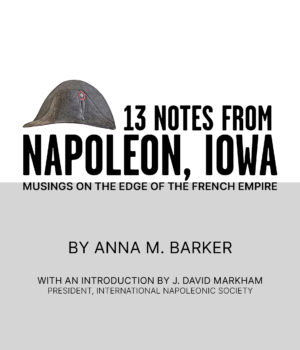13 Notes from Napoleon, Iowa: Musings on the Edge of the French Empire | Anna M. Barker | ISBN 9781948509701 | $24.95 | Release 10/11/2025 at the Iowa City Book Festival | Order early and get a signed copy
Born on August 15, 1769, in Ajaccio, on the Mediterranean island of Corsica, Napoleon was the ruler of Iowa between 1800 and 1803 when he served as the First Consul of the French Republic. Iowa City, Iowa, evolved out of the 1838 settlement named after him — Napoleon, Iowa — the location marked today by Napoleon Park, off Napoleon Lane, just south of Iowa City. The book illuminates aspects of Iowa’s French past, such as cities named after the Napoleonic battles of Marengo and Waterloo, and explains the mystery of Iowa’s distinctly French-looking flag. Along the way, the author muses on other Napoleon-related matters, such as Empire waist gowns, Goethe’s and Byron’s Bonapartism, the aftermath of the Battle of Waterloo, the Congress of Vienna, and to what extent Europe’s current internal contradictions have been impacted by its Napoleonic past.
“Only connect,” E. M. Forster’s famous advice to young novelists, is what animates Anna Barker’s astonishing travelogue in the footsteps of Napoleon Bonaparte, which takes her from Napoleon, Iowa (the original name of Iowa City, the first UNESCO City of Literature) to a wide range of places touched in some way by the legendary military figure whose imperial designs shaped, for good and ill, the modern world. Ms. Barker deploys her encyclopedic knowledge of history and literature, cinema and cuisine, and all things Napoleonic in service to a capacious vision of any meaning-making enterprise. She proves to be a delightful travel companion and a witty storyteller whose enthusiasm for her subject is infectious. Napoleon is everywhere.
—Christopher Merrill, Chevalier de l’Ordre des Arts et des Lettres, Director, International Writing Program, Author of Self-Portrait with Dogwood (2017) and On the Road to Lviv (2023)
“Anna Barker’s 13 Notes from Napoleon, Iowa contains a dazzling amount of insight into Napoleon’s life from every angle imaginable: his influence on fashion, on Dostoevsky and Byron, on politics and the world order from Easten Europe all the way to Iowa. Barker’s prose
sparkles, and her enthusiasm for All Things Napoleon is genuinely contagious.”
— Wyn Cooper, poet, lyricist, novelist, author of Postcards from the Interior (2005), Mars Poetica (2018), and Way Out West (2022)
“Napoleon. A thousand cannons sleep in that name,” said the German poet Heinrich Heine. If you want to hear those cannons, read Anna
Barker’s book 13 Notes from Napoleon, Iowa.
—Thomas Schuler, International Napoleon expert, Author of Wir sind auf einem Vulkan: Napoleon und Bayern (2015) and Auf Napoleons Spuren: Eine Reise durch Europa (2021)
“Put on your bicorn tourist hat and follow Dr. Barker’s beautiful prose on the steps of Napoleonic memory through Goethe, Byron, Puccini,
Dumas, and ABBA. Her collection of essays inspired by the Marengos, Bonapartes, and Napoleons of Europe and Iowa is breathtaking and
helps the reader engage with the idea that Napoleon is everywhere!”
—Dr. Marco Cabrera Geserick, Director, Latin American Studies, Northern Arizona University, Author of The Legacy of the Filibuster War: National Identity and Collective Memory in Central America (2019)
Anna Barker is an educator and journalist who, with her husband Jim, raised three children in Iowa City, Iowa, and teaches at the University of Iowa. She walks her Yorkie Watson along the Iowa River, writes on Iowa Avenue, publishes essays in the Iowa City Press-Citizen, and believes that this designational monotony could have been easily avoided if Iowa City would have retained the name of the original 1838 settlement – Napoleon.
Over the decades, Anna has taught War and Peace 20 times; curated a Dostoevsky exhibition; initiated a lecture series at the Museum of Russian Art in Minneapolis; and was invited to give talks on Tolstoy at his literary museum at Yasnaya Polyana and on Napoleon in Paris. Her prolific literary commentary – 1,400,000 words and counting – can be accessed on Substack at Anna’s Thinking Cap and is dedicated to the exploration of weighty tomes, such as Paradise Lost, Les Misérables, and Brothers Karamazov, in a historical and cultural context. Her full biography is available at the University of Iowa website.
